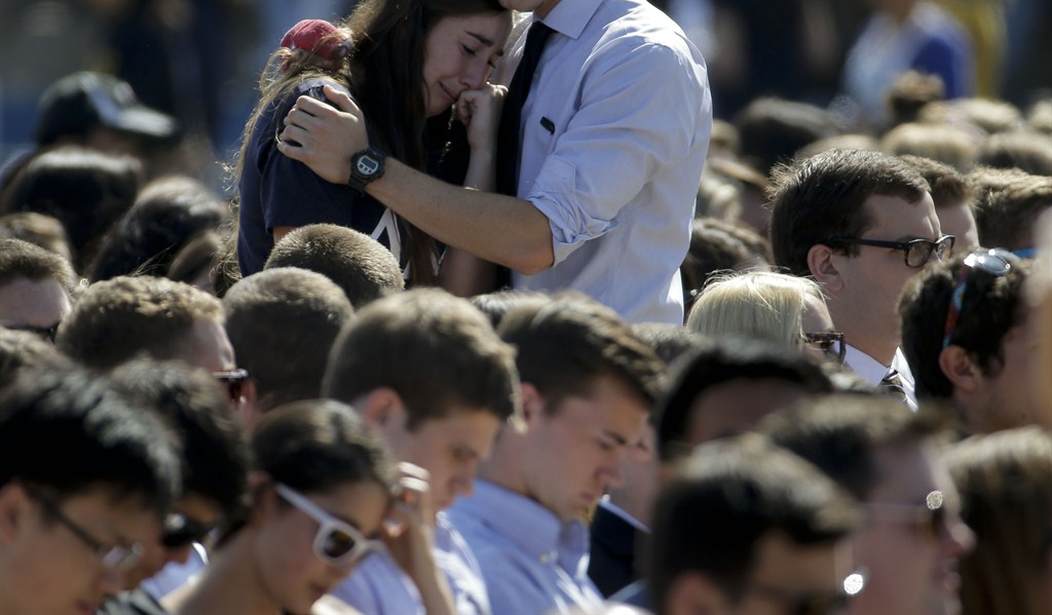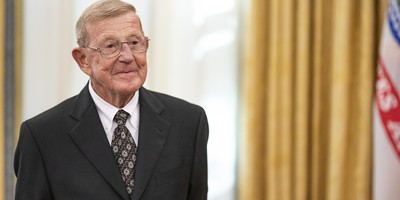WASHINGTON -- Apropos of a 22-year-old deranged student's slaughter of his male roommates, two coeds, and another male student, as well as leaving 13 injured and in the hospital, I have been doing my research. In the courses of which, I came across this quote on the front page of Tuesday's New York Times. A second-year student in global studies at the university where the crimes were committed said in the news story's second paragraph that, "If we don't talk misogyny now, when are we going to talk about it?" She went on in the next paragraph with similar profundities.
It put me in mind of another quote from the Times on Sunday in the op-ed section by columnist Charles M. Blow. He was commenting on the owner of the Dallas Mavericks' allegedly "bigoted" remark (though it seemed perfectly sensible to me) a few days before. Blow said the remark typified "the endlessly ached-for, perpetually stalled 'national conversation on race' that many believe is needed but neglected. ..."
Now I would say that these two "conversations" about misogyny and race have been going on for at least 40 years in America. They are not really conversations. They are always dominated by the feminists and by the opportunists on racial matters. They are monologues, and if someone enters a dissenting view, say, Phyllis Schlafly for the women or Clarence Thomas for the blacks, that person is denounced as a misogynist or an Uncle Tom.
An honest far-ranging discussion of such matters as misogyny or racial relations is inconceivable in the country at this time. Take the deranged 22-year-old whose atrocities were committed in idyllic Isla Vista, California, near the campus of the University of California at Santa Barbara. In the first news reports, the issue of gun control was immediately trotted out. Though California has some of the strictest gun control laws on the books, and there are already some 300 million guns at large in the country. Mental health laws were trotted, though again California has plenty of mental health laws and mental health professionals. There does seem to have been some negligence on the part of the police, but this is debatable. Concern for an individual's privacy is forever cited by Americans on both the left and on the right.
Recommended
One very large issue, however, is never discussed. Though there have been many similar outbreaks of shootings on college campuses and even at high schools, no one ever talks much about what is going on at those institutions. I would submit that far more important than increased gun control or increased regulations of mental health or even increased policing, there is a larger matter to be pondered. What is the purpose of education, and how are we handling education in America today?
College students have an abundance of rights without many obligations. They have little supervision, though the number of professors and administrators proliferates. Imagine the numbers of counselors, psychologists, even rape advisors on campus at the University of California at Santa Barbara, for instance. College students have only the vaguest idea about what their goals might be. For that matter, they have only the vaguest idea of a curriculum to follow, for instance, the aforementioned student who is immersed in "global studies." Does she have a foreign language and know the history of, well, the globe? What is she studying to become, a travel agent, an airline pilot or an agent of the Central Intelligence Agency? She is one of hundreds of thousands of college students who may graduate in four years or 40. The killer in California drove a black BMW given to him by his family. He frequented the local golf course and beaches. He took a couple of courses at the Santa Barbara City College or maybe he dropped them. No matter, he could always pick up a couple of courses next semester.
For over a generation a college campus has been, with few exceptions, a place where large numbers of young people, with very low time horizons, live in organized chaos: high-rise dormitories, perhaps off campus slums. They usually have very vague purposes to their lives that often seem positively grandiose. I say that while we indulge in our conversations about the NRA and mental health, we also take up a conversation about the purposes of these vast ghettos. It is about time that America decides what is the purpose of a university ... and, come to think of it, a high school, too.

























Join the conversation as a VIP Member